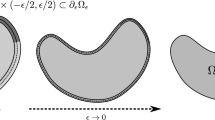Abstract
We present a reduced basis method for parametrized linear elasticity equations with two objectives: providing an error bound with respect to the exact weak solution of the PDE, as opposed to the typical finite-element “truth”, in the online stage; providing automatic adaptivity in both physical and parameter spaces in the offline stage. Our error bound builds on two ingredients: a minimum-residual mixed formulation with a built-in bound for the dual norm of the residual with respect to an infinite-dimensional function space; a combination of a minimum eigenvalue bound technique and the successive constraint method which provides a lower bound of the stability constant with respect to the infinite-dimensional function space. The automatic adaptivity combines spatial mesh adaptation and greedy parameter sampling for reduced bases and successive constraint method to yield a reliable online system in an efficient manner. We demonstrate the effectiveness of the approach for a parametrized linear elasticity problem with geometry transformations and parameter-dependent singularities induced by cracks.
Similar content being viewed by others
References
Ali, M., Steih, K., Urban, K.: Reduced basis methods based upon adaptive snapshot computations. Adv. Comput. Math. 43, 257–294 (2017)
Brenner, S.C., Scott, L.R.: The Mathematical Theory of Finite Element Methods, 3rd edn. Springer, New York (2008)
Chatelin, F.: Spectral Approximations of Linear Operators. Academic, New York (1983)
Huynh, D.B.P., Patera, A.T.: Reduced basis approximation and a posteriori error estimation for stress intensity factors. Int. J. Numer. Methods Eng. 72(10), 1219–1259 (2007)
Huynh, D.B.P., Rozza, G., Sen, S., Patera, A.T.: A successive constraint linear optimization method for lower bounds of parametric coercivity and inf-sup stability constants. C.R. Acad. Sci. Paris, Ser. I 345, 473–478 (2007)
Ladevèze, P., Leguillion, D.: Error estimate procedure in the finite element method and applications. SIAM J. Numer. Anal. 20, 485–509 (1983)
Milani, R., Quarteroni, A., Rozza, G.: Reduced basis method for linear elasticity problems with many parameters. Comput. Methods Appl. Mech. Eng. 197, 4812–4829 (2008)
Ohlberger, M., Schindler, F.: Error control for the localized reduced basis multi-scale method with adaptive on-line enrichment. SIAM J. Sci. Comput. 37, A2865–A2895 (2015)
Parés, N., Bonet, J., Huerta, A., Peraire, J.: The computation of bounds for linear-functional outputs of weak solutions to the two-dimensional elasticity equations. Comput. Methods Appl. Mech. Eng. 195, 430–443 (2006)
Phuong, H.D.B.: Reduced basis approximation and application to fracture problems. Ph.D. thesis, Singapore-MIT Alliance, National University of Singapore (2007)
Raviart, P.A., Thomas, J.M.: A mixed finite element method for 2nd order elliptic problems. In: Lecture Notes in Mathematics, vol. 606, pp. 292–315. Springer, Berlin (1977)
Rovas, D.V.: Reduced-basis output bound methods for parametrized partial differential equations. Ph.D. thesis, Massachusetts Institute of Technology (2003)
Rozza, G., Huynh, D.B.P., Patera, A.T.: Reduced basis approximation and a posteriori error estimation for affinely parametrized elliptic coercive partial differential equations — application to transport and continuum mechanics. Arch. Comput. Methods Eng. 15(3), 229–275 (2008)
Veroy, K.: Reduced-basis methods applied to problems in elasticity: analysis and applications. Ph.D. thesis, Massachusetts Institute of Technology (2003)
Yano, M.: A reduced basis method with exact-solution certificates for steady symmetric coercive equations. Comput. Methods Appl. Mech. Eng. 287, 290–309 (2015)
Yano, M.: A minimum-residual mixed reduced basis method: exact residual certification and simultaneous finite-element and reduced-basis refinement. Math. Model. Numer. Anal. 50, 163–185 (2016)
Yano, M.: A reduced basis method for coercive equations with an exact solution certificate and spatio-parameter adaptivity: energy-norm and output error bounds (2016, submitted)
Acknowledgements
I would like to thank Prof. Anthony Patera of MIT for the many fruitful discussions. This work was supported by OSD/AFOSR/MURI Grant FA9550-09-1-0613, ONR Grant N00014-11-1-0713, and the University of Toronto Institute for Aerospace Studies (UTIAS).
Author information
Authors and Affiliations
Corresponding author
Editor information
Editors and Affiliations
Rights and permissions
Copyright information
© 2017 Springer International Publishing AG
About this chapter
Cite this chapter
Yano, M. (2017). A Reduced Basis Method with an Exact Solution Certificate and Spatio-Parameter Adaptivity: Application to Linear Elasticity. In: Benner, P., Ohlberger, M., Patera, A., Rozza, G., Urban, K. (eds) Model Reduction of Parametrized Systems. MS&A, vol 17. Springer, Cham. https://doi.org/10.1007/978-3-319-58786-8_4
Download citation
DOI: https://doi.org/10.1007/978-3-319-58786-8_4
Published:
Publisher Name: Springer, Cham
Print ISBN: 978-3-319-58785-1
Online ISBN: 978-3-319-58786-8
eBook Packages: Mathematics and StatisticsMathematics and Statistics (R0)




